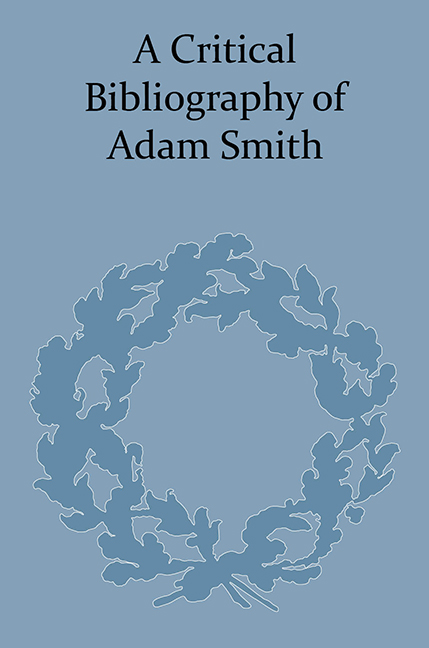Book contents
- Frontmatter
- CONTENTS
- Acknowledgements
- General Introduction
- Early Editions of Adam Smith's Books in Britain and Ireland, 1759–1804
- Adam Smith in English: From Playfair to Cannan
- The Glasgow Edition of the Collected Works of Adam Smith
- The Diffusion of the Work of Adam Smith in the French Language: An Outline History
- The German Reception of Adam Smith
- Adam Smith in Russian Translation
- The Reception of Adam Smith's Works in Poland from the Eighteenth to the Twentieth Centuries
- Adam Smith in the Spanish- and Portuguese-speaking World
- Translations of Adam Smith's Works in Japan
- Adam Smith in China
- Notes to the Bibliographies
- Main Bibliography: All Editions, Chronologically Ordered
- Bibliography by Individual Work
- Bibliography by Language Group
- Note on Dutch Editions
- Note on Italian Editions
- Note on Romanian Editions
- Index
Adam Smith in Russian Translation
- Frontmatter
- CONTENTS
- Acknowledgements
- General Introduction
- Early Editions of Adam Smith's Books in Britain and Ireland, 1759–1804
- Adam Smith in English: From Playfair to Cannan
- The Glasgow Edition of the Collected Works of Adam Smith
- The Diffusion of the Work of Adam Smith in the French Language: An Outline History
- The German Reception of Adam Smith
- Adam Smith in Russian Translation
- The Reception of Adam Smith's Works in Poland from the Eighteenth to the Twentieth Centuries
- Adam Smith in the Spanish- and Portuguese-speaking World
- Translations of Adam Smith's Works in Japan
- Adam Smith in China
- Notes to the Bibliographies
- Main Bibliography: All Editions, Chronologically Ordered
- Bibliography by Individual Work
- Bibliography by Language Group
- Note on Dutch Editions
- Note on Italian Editions
- Note on Romanian Editions
- Index
Summary
From the time of Peter the Great Russian proposals for social and economic reform and the ‘modernisation’ of institutions often drew for their substantive and ideological resources upon imports from Western Europe, a particular idea being endowed with especial force simply by virtue of its origin in Western culture. Russian students attending universities in Western Europe formed an important medium for the transmission of ideas eastwards, and it was in just this way that Adam Smith quickly gained a prominent position in the thinking of liberal and reformist circles in nineteenth century Russia.
In 1761 two such students were sent from Moscow University to Glasgow, where they attended Adam Smith's lectures, the impact that these lectures made on them being reflected in their later work. S. E. Desnitsky and I. A. Tretiakov attended Smith's Glasgow lectures on ethics, rhetoric and law and also attended those of John Millar, Smith's pupil. The timing of their studies is of especial interest since they attended Smith's lectures immediately before his visit to France, a period which of course also coincides with the record of Smith's lectures subsequently published by Cannan in 1896 as Lectures on Justice, Police, Revenue and Arms. In 1767 they graduated as doctors of law; they then returned to Russia where Tretiakov was appointed to a chair at Moscow University in 1768. His academic career was cut short in 1776 and he died in 1779; the only record of his teaching that has survived is three addresses held in the University, one of which in 1772 was intended to honour the tenth anniversary of Catherine the Great's accession to the throne. Comparison of the text of this lecture with Cannan's edition of Smith's lectures makes abundantly clear that Tretiakov's address was to a great extent a synthesis from his own Glasgow lecture notes, for of course at this time Smith had not published anything relating to the division of labour, the increase of stock, or the progress of civilisation.
- Type
- Chapter
- Information
- A Critical Bibliography of Adam Smith , pp. 153 - 167Publisher: Pickering & ChattoFirst published in: 2014



